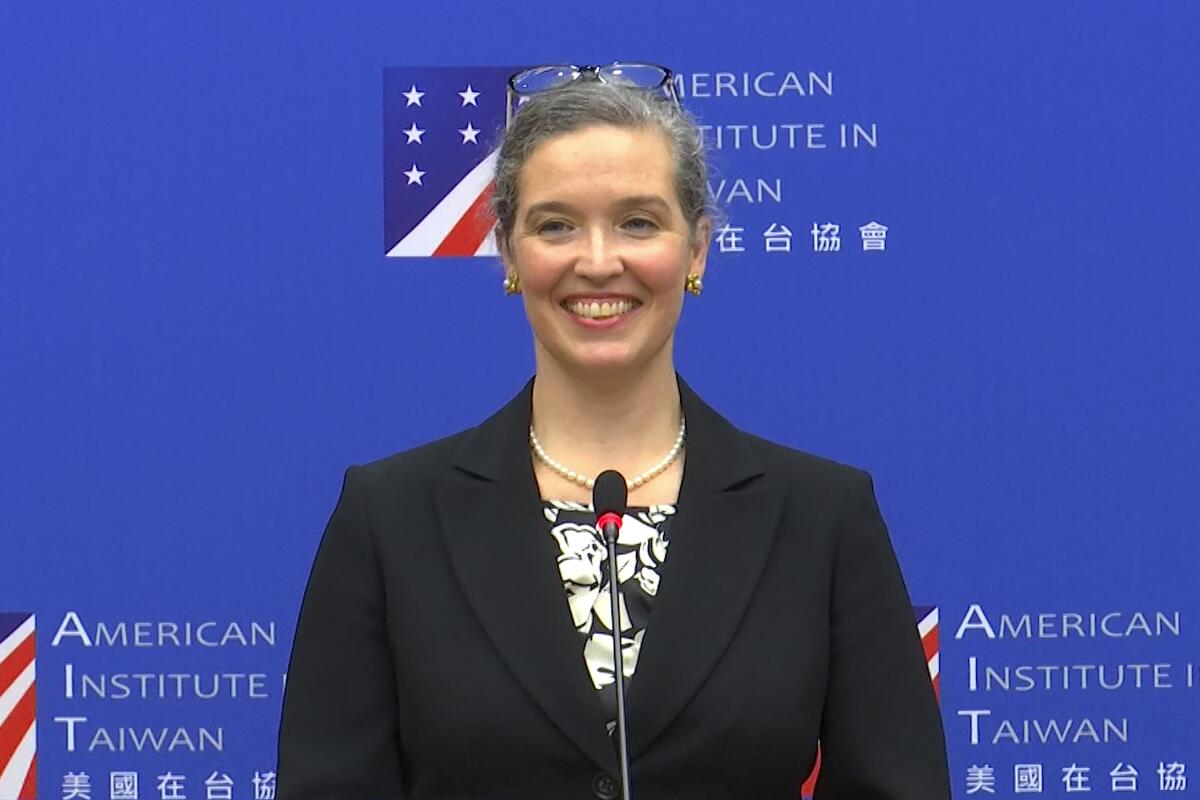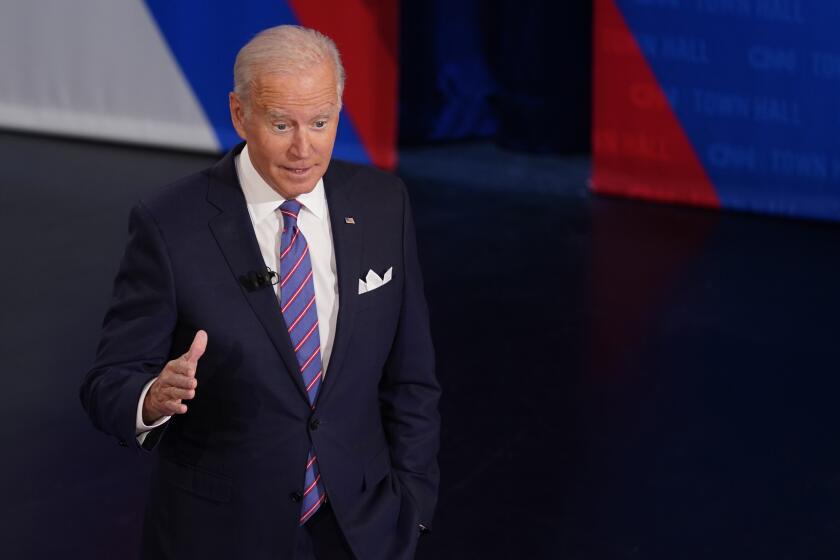U.S. wants to deepen relations with Taiwan amid rising tensions with China

- Share via
TAIPEI, Taiwan — Washington wants to deepen its relationship with Taiwan, the self-ruled island that has become a major point of contention in the strained U.S.-China relationship, and will work to counter Beijing’s “malign” influence, a U.S. diplomat said Friday.
In her first public news conference, Sandra Oudkirk, the new director of the American Institute in Taiwan, the de facto U.S. embassy, reiterated that the U.S. remains deeply committed to Taiwan and is actively working on new areas of cooperation such as cybersecurity and supply chains.
“The value of our partnership and our support for Taiwan is rock solid,” Oudkirk said. “We are committed to deepening our ties with Taiwan.”
The U.S. support for Taiwan comes as tensions between China and the island are now at their highest in decades, with Beijing stepping up its military harassment by flying fighter jets toward Taiwan. China has not ruled out force to reunify with Taiwan, which split from the mainland in 1949 after the Chinese civil war.
The U.S. switched diplomatic recognition of China from the ruling Nationalist Party government in Taipei to the Communist Party in Beijing in 1979 but has continued to maintain a strong unofficial relationship with the democratically ruled island.
Oudkirk declined to comment on any security initiatives or give any details of the presence of U.S. troops on the island, after Taiwanese President Tsai Ing-wen confirmed Thursday that U.S. boots were indeed on the ground, though fewer than what people might think.
Beijing insists there is ‘no room’ for compromise or concessions over the issue of Taiwan, which China maintains is part of its rightful territory.
“We are going to continue to advance global and regional goals of the Biden administration, including countering malign PRC [Chinese] influence, recovering from the devastating impacts of the pandemic and addressing the threat of climate change,” Oudkirk said.
Washington has supported Taiwan with arms sales to boost the island’s ability to defend itself, and the U.S. Navy routinely navigates the waters around the island in what it calls freedom-of-operation movements.
Oudkirk, who became the de facto ambassador over the summer, also reaffirmed that the U.S. would support Taiwan on the international stage, without giving details.
Secretary of State Antony J. Blinken on Tuesday called on other members of the United Nations to support Taipei’s independent participation in international organizations related to transportation, health, climate change, culture and education. Taiwan, for example, is not a member of the World Health Organization.
A stronger army is needed to deter a wider conflict that could entangle the U.S. at a time when calls are growing in Washington to defend the island.
China has already slammed Blinken’s statement. On Friday, Foreign Ministry spokesperson Wang Wenbin said China was the “sole legitimate government” representing the whole of China, including Taiwan, in the international bodies.
“If anyone still tries to challenge the ‘one China’ principle and challenge UNGA Resolution 2758, they will only suffer an even greater defeat,” Wang said, referring to the U.N. resolution that opened the way for China to join the United Nations.
A major new focus of the U.S.-Taiwan relationship is on supply chains amid a global crunch in computer chips known as semi-conductors.
Taiwan is home to Taiwan Semiconductor Manufacturing, or TSMC, which is the biggest contract manufacturer of processor chips in the world. Those chips are used in everything from smartphones and medical equipment to gaming computers.
U.S. Gen. Mark Milley says that China’s recent test of a hypersonic weapon is ‘very concerning’ and that the U.S. is working on similar weapons.
In recent weeks, local media reported that Taiwanese companies were concerned about a request for information from the U.S. Department of Commerce to chipmakers on potentially sensitive information such as their inventory, production and their top customers. TSMC, for example, serves clients in China as well as across the world.
“I have stressed that the Department of Commerce’s recent request for information is just that: It is a request,” Oudkirk said in response to those concerns, saying that acceding to it was voluntary.
More to Read
Sign up for Essential California
The most important California stories and recommendations in your inbox every morning.
You may occasionally receive promotional content from the Los Angeles Times.












